
Home >
Events and Activities >
News Archive
News Archive
- 35th Annual General Meeting (AGM) Notice
- 34th Annual General Meeting (AGM) Notice
- 33rd Annual General Meeting (AGM) Notice
- 32nd Annual General Meeting (AGM) Notice
- Congratulations to our 2020 Winners!
- One for the Photo Album: 31st Annual General Meeting (30 May 2020)
- 31st Annual General Meeting Notice (Online AGM)
- Catching Up with the Winners of the ASCD Gold Medal and Book Prizes 2019
- ASCD Gold Medal and Book Prizes 2019
- Teachers' Conference
- Workshop: Questioning Strategies to Activate Student Thinking, by Ms Tang Swee Noi
- 30th Annual General Meeting and Buffet Hi-Tea
- ASCD Empower19 Annual Conference
35th Annual General Meeting (AGM) Notice
This year, ASCD (Singapore) will be holding our Annual General Meeting (AGM) in the Balmoral Hall at the Royal Plaza on Scotts hotel. You must confirm your attendance via email by 10th May 2024.
This year, ASCD (Singapore)'s members will elect the 19th Executive Council, including two new Hon Auditors. The Nomination Form should be returned to us by 10th May 2024.
The following reports will be sent out prior to the AGM: Annual Report, Auditor's Report and Minutes of the 34th AGM. Note that any notice of any other business which you would like to discuss should be made to the Honorary Secretary two weeks before the GM, that is, by 10th May 2024.
On 25th May 2024, registration will be open at 9.15am and attendance will be recorded. In the event of an insufficient quorum, a workshop entitled "Heart-Based Listening" will be presented by We Are Hear (WAH), Singapore. After the workshop, the AGM will be held and called to order at 10.45am.
The AGM is your opportunity to exercise your voting rights and select the right people to help you get the best of your ASCD (Singapore) membership. Please reply to us by email to ascdadmin@work-solutions.com to confirm your attendance. Do ensure that you include the following information in your email: Your name, email address and mobile phone number.
We look forward to seeing you on Saturday, 25th May 2024, at 9.15am!
This year, ASCD (Singapore) will be holding our Annual General Meeting (AGM) online. You must confirm your attendance via email by 5th May 2023.
Proxy Forms will be sent to Members who confirm their attendance so that they may exercise their votes. Proxy Forms have to be returned by 16th May 2023 in order for us to tabulate the votes.
The AGM on 19th May 2023 will be called to order at 4.00p.m. Attendance will be recorded. In the event of an insufficient quorum, the AGM will be held at 4.30 p.m. on the same day and will proceed online.
This year, the 17th ASCD (Singapore) Executive Council will continue with the 2nd year of their tenure. As we need to have new Hon Auditors every year: only the two positions of Hon Auditors will be up for election. We have enclosed the Nomination Forms for the two positions of Hon Auditor. The Nomination Forms should be returned to us by 5th May 2023.
Please note that the following reports will be sent out prior to the AGM.
o The Annual Report,
o The Auditors’ Report, and
o Minutes of the 33 rd AGM.
This year, we have to implement a Change in our Constitution to allow Virtual Meetings. The proposed change is in the attached document. The document will be filed with the Registrar of Societies after it has been passed during the AGM.
Please note that any notice of any other business which you would like to discuss should be made to the Honorary Secretary 2 weeks before the AGM, that is by 5th May 2023.
The AGM is your opportunity to exercise your voting rights and select the right people to help you get the best of your ASCD (Singapore) membership. Please reply as soon as possible to us by email to ascdadmin@work-solutions.com to submit your nominations and any business for discussion as well as to confirm your attendance. Please also ensure that you include the following information in your email:
o Your name
o Your email address
o Your mobile phone number
We look forward to seeing you ONLINE on Friday, 19th May 2023, at 4.00 p.m.!
33rd Annual General Meeting (AGM) Notice
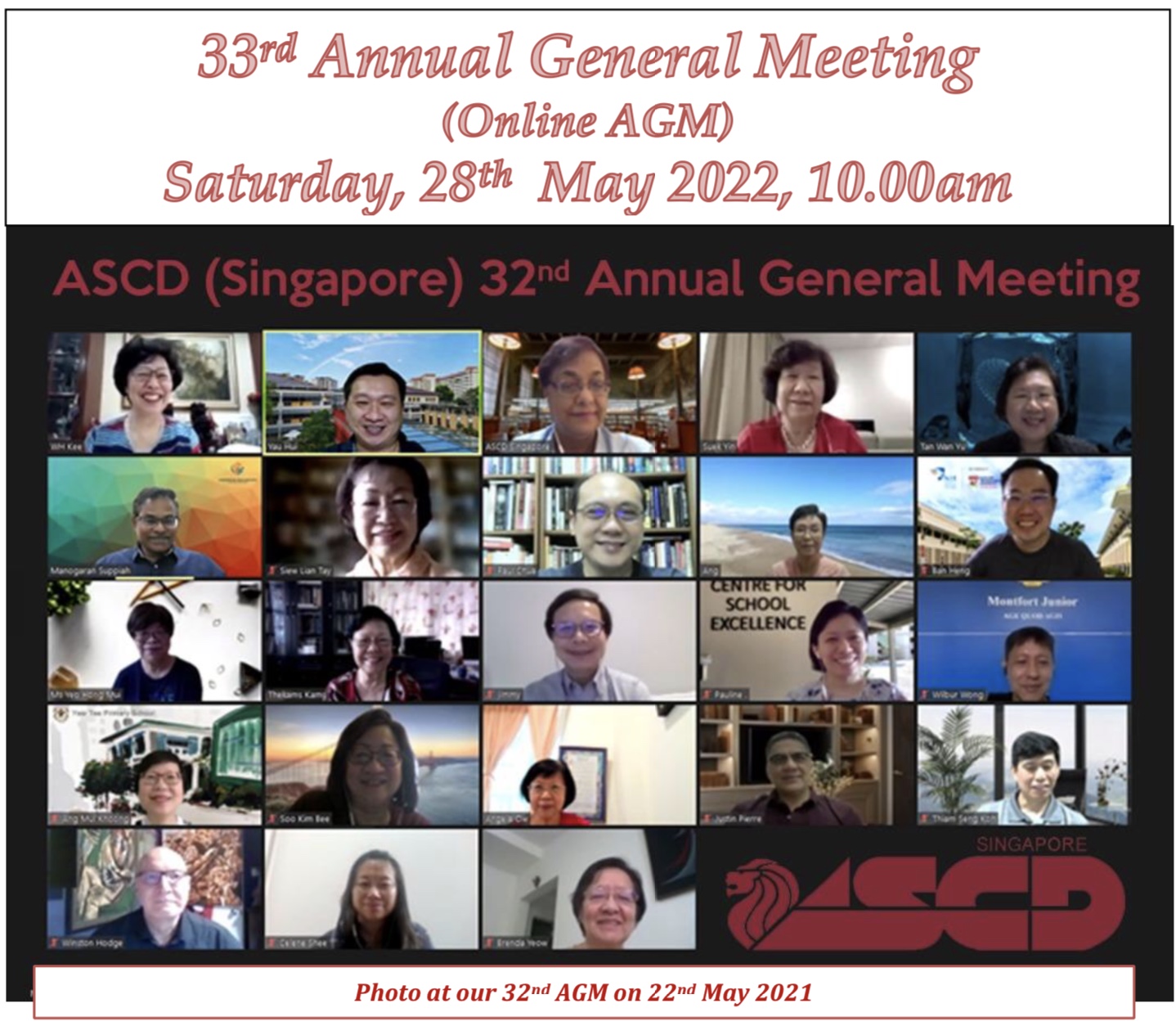
ASCD (Singapore) will be holding our Annual General Meeting (AGM) online for the third year. Although there has been much easing for gatherings of large groups of people, we decided that we should continue with the online meetings until members are more relaxed about in-person meetings.
At this year's AGM, we will elect the full 17th ASCD (Singapore) Executive Council whose tenure will be from 1st July 2022 to 30 June 2024, as well as two Hononary Auditors. The Nomination Form for all positions should be sent by 14 May 2022. More details about the AGM can be found here.
Please confirm your attendance via email so you can be included in the proceedings using the zoom links which we will send to you seven days before the meeting. The AGM will be called to order at 10am. Attendance will be recorded.
Below is the programme for the day:
9.30am: Registration
10.00am: AGM - Confirmation of quorum
10.30am: President's Address
- President's Address
- Confirmation of the Minutes of the 32nd AGM
- Presentation of the Annual Repot of the 16th Executive Council
- Treasurer's Report for 1 January to 31 December 2021
- Elections for the ASCD (S) Council and Hon Auditors
- Any other business
12.00pm: End of AGM
The 32nd Annual General Meeting of the ASCD (Singapore) will be held online on Saturday, 22 May 2021 at 10.30am.
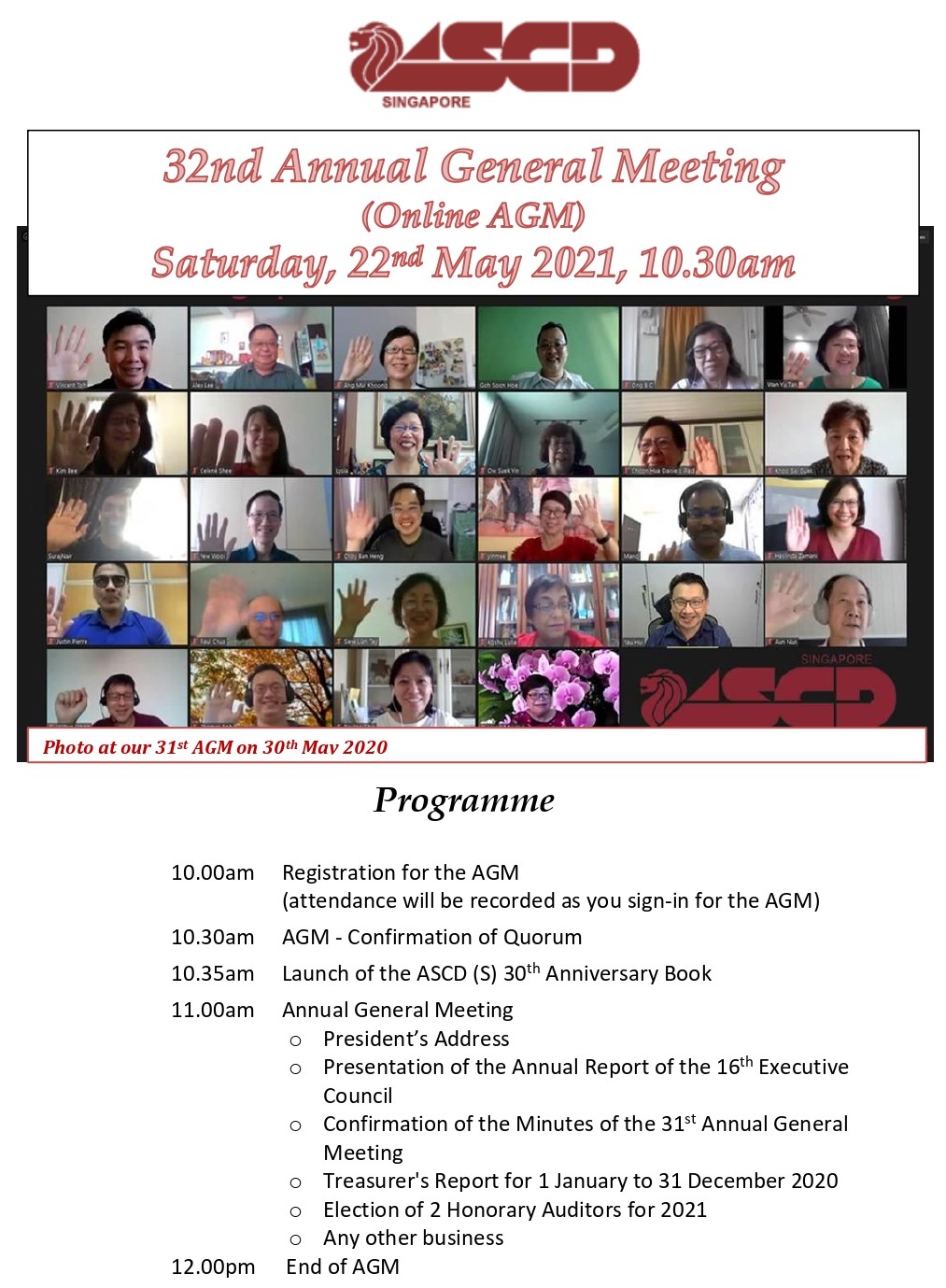
We are pleased to announce the winners of the ASCD(S) Gold Medal 2020 (Mr Tan Keng Cheong), and the Capstone Project 2020 (Mr Lee Fook Loong Eugene). Here, we present interviews with the two men about their thoughts and plans for the future:
Interview with ASCD(S) Gold Medal 2020 Winner, Mr Tan Keng Cheong
%20Gold%20Medal%20winner%202021%20Tan.jpg)
Q: Please describe what you do now and how the course has helped you with your work. How have the prizes helped you or contributed to your professional development?
I am currently a Year Head in a secondary school and I oversee student matters as a member of the Student Development Team. Other than my teaching duties as an English teacher, I support my colleagues in designing the school-based co-curriculum framework and programmes. I was previously teaching Economics in a junior college before the Masters programme.
The Master of Education (MEd) (Curriculum and Teaching) programme has been an enriching and perceptive experience as the programme provided a useful pit stop for me to reflect and to hone my craft as an educator. The interactive programme design, based on andragogy principles, allows me to customise and take ownership of my learning, creating opportunities for deep conversations with a diverse group of like-minded educators. Being exposed to these diverse perspectives allows me to have a deeper understanding of curriculum and assessment principles, its history and development as well as the different ideologies and policies that underpins the Singapore education system.
Understanding the principles of curriculum design also allows me to better understand and appreciate the differences in curriculum structures, which is particularly relevant in my transition as an educator from junior college to secondary school and in subject, from English to Economics. The deep conversations and close mentorship during the MEd programme also provided much food for thought in my work now as a curriculum designer for the school’s co-curriculum framework and programmes. Such discourse and interactions also gave me the confidence and perspectives to lead my teachers in school-based curriculum and co-curriculum development even as I made the transition to teach in a secondary school. I am currently looking at how Solow’s taxonomy can be used for peer-and-self assessment to develop self-directed and collaborative learners, in a technology-rich environment. This is particularly relevant now as we look at the roll-out of the CCE 2021 curriculum and the Personal Digital Learning Programme.
Being the recipient of the the ASCD Gold Medal is a great privilege and provides affirmation and confidence for me moving forward to carry out my plans for co-curriculum development. The prize would also not have been possible without the support of the wonderful faculty and fellow educator friends in the MEd course as well as my family, especially my wife. I thank ASCD and NIE for the affirmation as I continue embarking on my self-discovery as an educator.
Q: What do you think are urgent issues in the area of curriculum development in your own field of specialisation?
I believe that the constant challenge in curriculum development is to design a differentiated curriculum that meets the diverse needs of the learners while ensuring that the skills and knowledge that students acquired are relevant for them to be future-ready. I think the Singapore Education System has done a great job, evident in the PISA and TIMSS educational rankings as well as the high employability of our graduates.
There are, however, several urgent issues that the education system and schools must address moving forward as we prepare for the technological and socio-economic changes that are upon us. I would like to focus on two of them. The first is the digitalisation of the workplace and by extension, schools. Schools must make use of the affordances of technology to inculcate digital literacy and skills in our students. The COVID-19 pandemic provides fresh impetus and urgency for teachers to adopt innovative pedagogies and tools, such as Zoom and the Student Learning Space (SLS) to engage our students. While the pandemic highlights how versatile and resilient our teachers and students can be, there is a need to take a step further to re-examine how our curriculum can be revamped to better support these new modalities of teaching and learning as well as review the content, the skills and knowledge that our students will need.
The second issue that we urgently need to examine is how the curriculum needs to move away from “what” to learn to the question of “how” to learn. With the VUCA world upon us, content knowledge is made obsolete at an increasing pace and students need to have the aptitude to learn, re-learn and unlearn in order to remain relevant. This is why the development of self-directed and collaborative learners who are able to learn independently and think creatively is so important. This has long been touted as an educational outcome for our students but we still have some way to go. In the 2018 PISA Global Competence study, Singapore students came up tops in the overall rankings but fared below average in the category of self-perceived cognitive adaptability. The indicator examines the ability of students in adapting their thinking and behaviour to novel situations. This perhaps highlights the tendency of our students to focus on the “right answers” amidst an examination-oriented culture that rewards accuracy and compliance. As we move towards equipping our students with the tools to navigate uncertainty, the curriculum will also need to be revisited to provide more opportunities for students to experiment, more opportunities for students to fail and more opportunities to develop their voice, as we move to a curriculum that facilitates heutagogy, where the teacher takes a back seat and students take the lead in designing their learning experiences and content.
Interview with Capstone Project 2020 Winner, Mr Lee Fook Loong Eugene
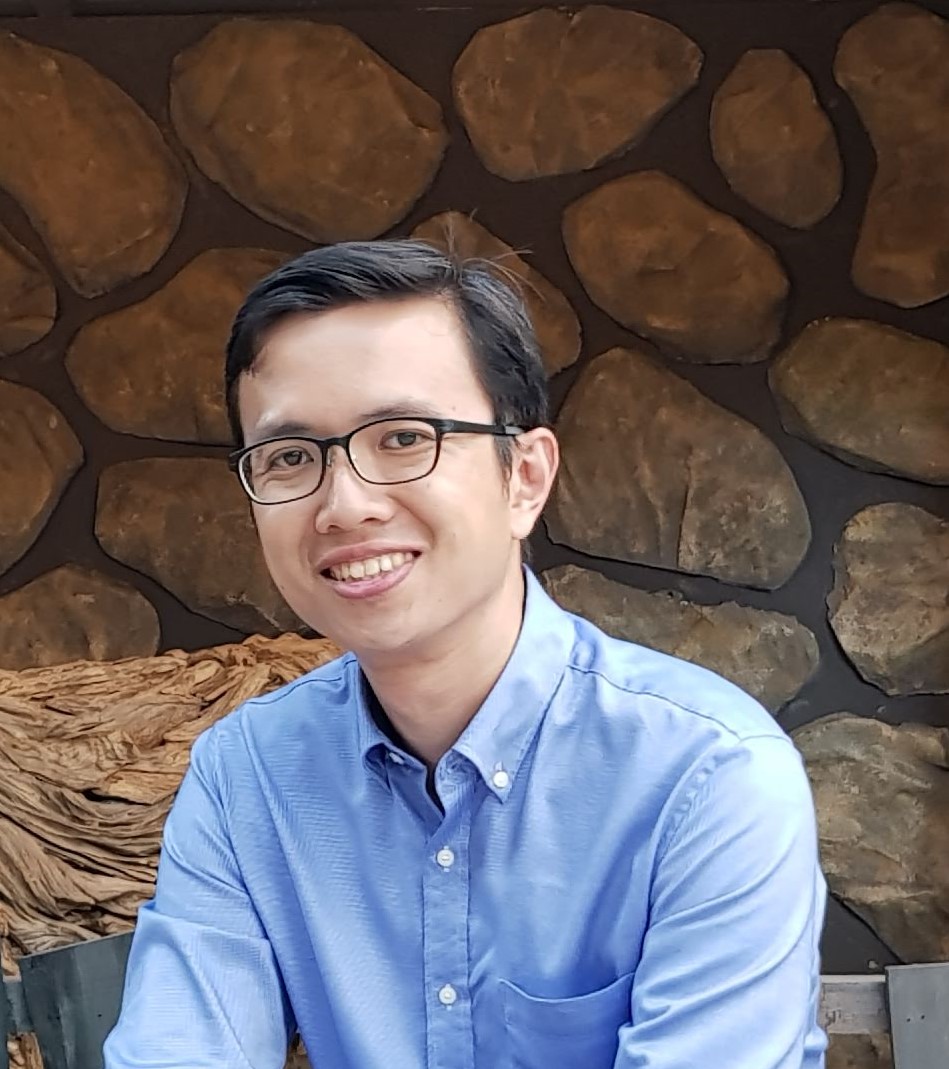
Q: Please describe what you do now and how the course has helped you with your work. How have the prizes helped you or contributed to your professional development?
Currently, I am a vice-principal at a primary school. I have benefited a lot from this Master in Education (Curriculum and Teaching) because I am now better equipped to provide curriculum and assessment leadership in my school. As a school leader, it is important for me to understand curriculum as part of the whole school experience, and not just in the classroom, teaching students a particular subject. As part of the school leadership team, we have to make many decisions including assembly and other curricular and co-curricular experiences in school. The course has broadened my own understanding of curriculum and learning to encompass all the different learning experiences that students have in schools. Having the opportunities to engage in sharing and discussions that lead to this enhanced conception of curriculum has been one of the greatest contribution of this course to my professional work.
Q: Can you briefly summarise your dissertation and your critical inquiry project which won prizes?
As part of my integrative project, I examined how teachers notice algebraic errors. In my experience as a teacher in the classroom, we often come across students’ errors in their work. Despite our efforts to do corrections and remediation, these errors continue to persist. In my previous role as a HOD, supervising teachers, I also notice that different teachers have different capacities and tendencies to notice different things about students’ thinking, or give different levels of attention to students’ thinking. That led me to think about and work on this project. As a math teacher, I believe that how teachers can respond to students’ errors is a pressing issue. I happen to chance upon Dr Choy’s work on mathematics teacher noticing and that inspired me, through more reading and research, to look deeper into the idea of teacher noticing. I have not come across this in the past but I instinctively know that it is an expertise that all teachers actually learn to develop along the way. In fact, more experienced and more competent teachers seemed to be better equipped to notice students’ errors and they know the actions to take in response to students’ errors to improve learning. That spurred me to look more deeply into this topic by thinking through the possible frameworks to frame my own thinking, develop research methods to derive more robust findings that can be translated into ideas to support teachers to better notice students’ errors and respond to them in ways that are mathematically productive.
Q: What do you think are urgent issues in the area of curriculum development in your own field of specialisation?
Moving forward, I think teacher noticing is an important skill for all teachers. We do not discuss enough about it, or rather, there is no common language within our school context to talk about teacher noticing. It’s often implied or left unspoken when we discuss how we can support teachers in their teaching. One of the things I now do on a regular basis is to go into classes and observe lessons so that I can advise and support teachers to improve teaching and learning. The notion of teacher noticing will come in handy because I can give more targeted feedback to teachers by asking them to reflect beyond the surface in their classrooms and think about different possibilities on how they can respond to different classroom situations. I want teachers to understand that ultimately, it is through the reflective process that helps them to improve their teaching.
Here's a quick snap from our 31st AGM - held online!
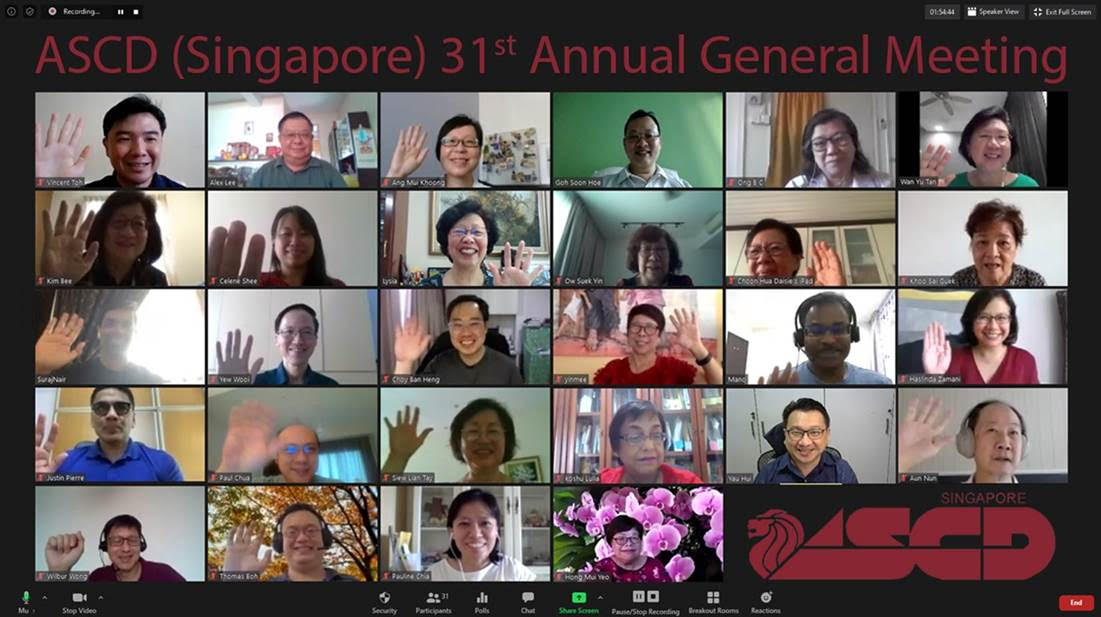
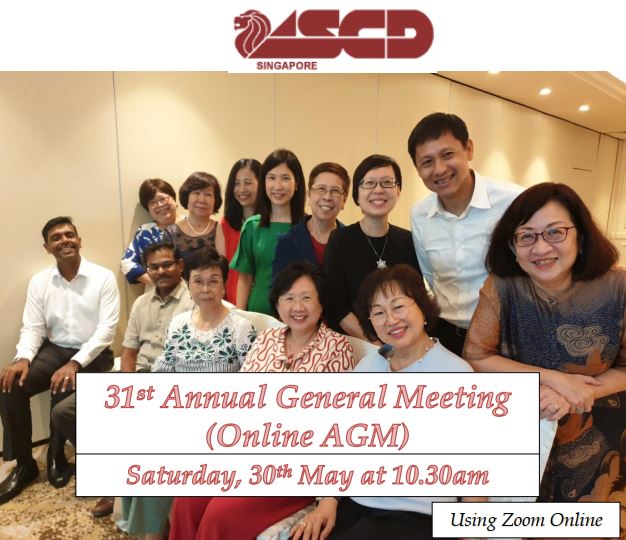
The 31st Annual General Meeting will be held on 30th May
(Saturday), at 10.30am, using Zoom Online. A step-by-step procedure on
how to log on will be provided to all attendees before the AGM.
The programme for the AGM is as follows:
10:00am: Registration for the AGM
(Your attendance will be recorded as you sign in for the AGM)
10:30am: AGM - Confirmation of Quorum
10:35am: Breathe with Me - Mini workshop by Dr Cheah Yin Mee
11:00am: Annual General Meeting
- President's Address
- Presentation of the Annual Report of the 15th Executive Council
- Confirmation of the Minutes of the 30th Annual General Meeting
- Treasurer's Report for 1st January to 31st December 2019
- Resolution for Change in Constitution
- Election of Members of 16th Executive Council 2020-2022
- Election of two Honorary Auditors for 2020
- Any other business
12:00pm End of the AGM
We caught up with the winners of this year's ASCD Gold Medal and Book
Prizes and asked them for their reflections. Here's what they had to
say:
- ASCD Gold Medal winner Emen Low Xiankai
- ASCD Book Prize for Best Capstone Project Sharon Yap Ching Ling
- ASCD Book Prize for Best Dissertation Adrian Tan Kok Wui
ASCD Gold Medal winner Emen Low Xiankai
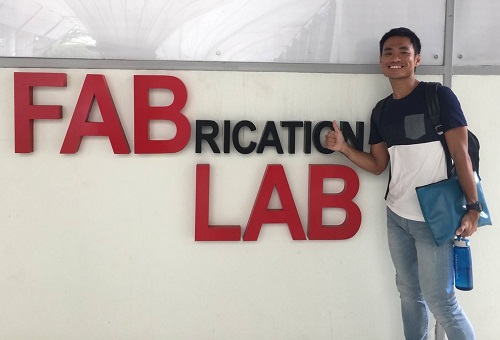
Q: Please describe what you do now and how the course has helped
you with your work. How have the prizes helped you or contributed to
your professional development?
I will always be grateful to the Association for Supervision and
Curriculum Development (ASCD) for recognising my efforts in the Masters
of Education (Curriculum & Teaching) course. I have benefited in so
many ways from the thought-provoking lectures, developmental tutelage
and riveting discussions with peers. Allow me to focus on my
professional development in the following two ways.
Firstly, in my decade of service in public education, I have
remained humbled by the vast expanse of challenges our learners face,
and how our deliberate curricular and pedagogical decisions will either
help or hinder our learners to overcome these challenges. In the course
of my study, I have been inspired by the vast array of research that
calls into question routine practices, and urges us to reimagine our
expectations of schooling; in fact, my key research interest remains the
interlocking nature of teaching, learning and assessment, and how these
may be highly leveraged to offer a more equitable schooling experience
to underprivileged individuals and families.
Secondly, I remain fascinated by the diversity that characterises
our schools. I am keen to explore the impact of diversity (e.g.
ethnicity, nationality, social class and gender) on the way curriculum
is experienced by both learners and teachers. Whether it is the
cultivation of future-readiness or values that typify our citizens, I am
curious to explore how our standardised curriculum may continue to
evolve in order to better serve an increasingly complex diversity of
learners and teachers. In this vein, going forward, I am determined to
work on research that will help clarify the future value proposition of
public education in Singapore.
My achievements in education may not be attributed to my efforts
alone. I will always be indebted firstly, to my supportive family who
never turned a deaf ear to my rants, secondly, to the fiercely
passionate peers and colleagues who broaden my worldview, and lastly, to
the highly energetic and authentic learners who fuel my imagination. It
gives me immense pleasure and pride to be able to give back to the
community that continues to nurture me as an educator. It is my daily
mission to do the right thing, and to do things right.
ASCD Book Prize for Best Capstone Project Sharon Yap Ching Ling
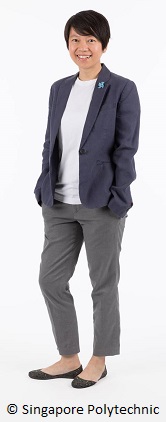
Q: Please describe what you do now and how the course has helped
you with your work. How have the prizes helped you or contributed to
your professional development?
I am an Academic Mentor at the School of Life Skills and
Communication (LSC), at Singapore Polytechnic (SP). In addition to
teaching, I support my school and colleagues in curriculum and teaching
design and development matters, and in professional learning.
I found NIE’s MEd (Curriculum and Teaching) course tremendously
helpful to my work as it greatly broadened and deepened my notions of
the complexities that characterise and underlie teaching-learning
relationships, curriculum and assessment design, and professional
learning. I hope that it will translate into a greater ability on my
part to make insightful contributions to dialogue and wiser
decision-making to respond to both everyday work and novel disruptions.
Receiving the ASCD book prize was a pleasant surprise! I am still
making sense of its implications, but I suppose it does make me think
more seriously about whether my critical inquiry ideas could be
realised.
Q: Can you briefly summarise your dissertation and your critical inquiry project which won prizes?
My critical inquiry project seeks to theorise or construct a frame
through which to understand how students and teachers in the context of
an SP institutional programme dynamically co-construct “trust” in a
bi-directional relationship, and the importance of “trust” in students’
educative experience.
“Trust” is interesting because it is not a singular or unitary
construct. Indeed, it is a very slippery one in the sense that different
disciplines define, study and construct it differently, there are
controversies over how “trust” is built and broken, it can shift with
time and depends on who is doing what in a “trust” relationship. In our
context, we do not know if “trust” is even the “same thing” to students
and teachers (some research indicates it is not), or whether our
teaching-learning relationships should more appropriately be viewed
through lenses of “distrust,” “mistrust” or “lack of trust” than
“trust,” with its normatively positive implications.
My project thus aims to construct an understanding of what might
be going with students and teachers in their human agency in
relationship-building, and hopefully add to our collective wisdom to
cultivate rich and enduring experiences for our learners.
Q: What do you think are urgent issues in the area of curriculum development in your own field of specialization?
I feel we face challenges in how curriculum should be reimagined
and redesigned for “optimal” or “effective” learning in a constantly
shifting education landscape of competing discourses and narratives of
urgency that value certain modes of living/learning, such as greater
digitalisation. How can we critically contemplate the beliefs and
assumptions underlying the demands placed on us to act, yet shift our
paradigms quickly? To what extent should we shift, or should we shift in
other directions? I think these are some of the crucial questions we
must continue asking as we make sense of how the world is changing, and
exert our own influence in shaping the way we think about and take
action on it.
ASCD Book Prize for Best Dissertation Adrian Tan Kok Wui
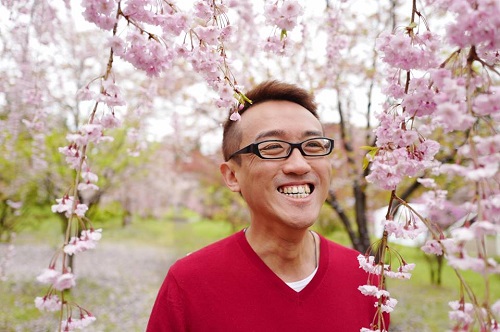
I was blessed to be given a chance to serve as a Head of
Department at Raffles Institution after joining school and in this role,
I oversee 4 main subjects in the Knowledge Skills Department: General
Paper, Project Work, Knowledge & Inquiry and English Language &
Linguistics. In this role, I often find myself thinking about ways to
make meaningful changes for both teachers and students. Very often,
however, while there is an awareness that there are things that could be
improved, I did not have the right vocabulary or that ability to frame
the problem effectively. The Master of Education course gave me what I
lacked: the conceptual knowledge and ability to articulate what the root
causes of these problems were. As Head of Department overseeing Project
Work at the JC level, traits like collaboration and independent
learning are important goals. My research into the subject is to use PW
as a case study to delve deeper into a subject that aims to deliver
outcomes related to 21st Century skills and how it has fared in terms of
assessment and its outcomes. Essentially, I argue in my dissertation
that we have to be careful not to put the cart before the horse – in
other words, not let assessment drive curriculum, else outcomes related
to character traits and intangible qualities would just be lip-service
and any good outcome, merely incidental. These issues related to 21st
Century skills and competencies are important to consider, given the
changing needs of society. Not taking this seriously may result in us
being good at running a race that is increasingly becoming irrelevant.
ASCD Gold Medal and Book Prizes 2019
Singapore ASCD sponsors book prizes for outstanding students in
the higher degree programmes at the National Institute of Education. At
this year's award ceremony held on August 7th, the ASCD Gold Medal and
Book Prizes were awarded to three deserving recipients.
The three awards are as follows:
-
ASCD Gold Medal
: Awarded to the top graduate with outstanding performance in
the MEd programme specialising in Curriculum & Teaching
-
ASCD Dissertation Book Prize:
Awarded to the Best Dissertation submitted for examination by a
graduate from the MEd programme specialising in Curriculum &
Teaching
-
ASCD Capstone Project Book Prize:
Awarded for the Best Capstone Project submitted for examination
by a graduate from the MEd programme specialising in Curriculum &
Teaching
Below are some photos from the event:
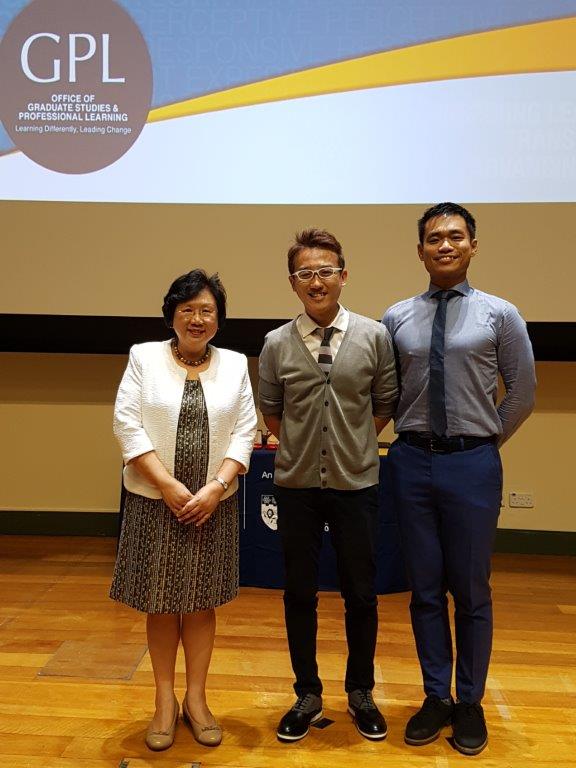
|
.jpg)
|
|---|---|
| Singapore ASCD President Mrs Tan Wan Yu, with two of the award recipients | ASCD Gold Medal winner Low Emen Xiankai, receiving his award |
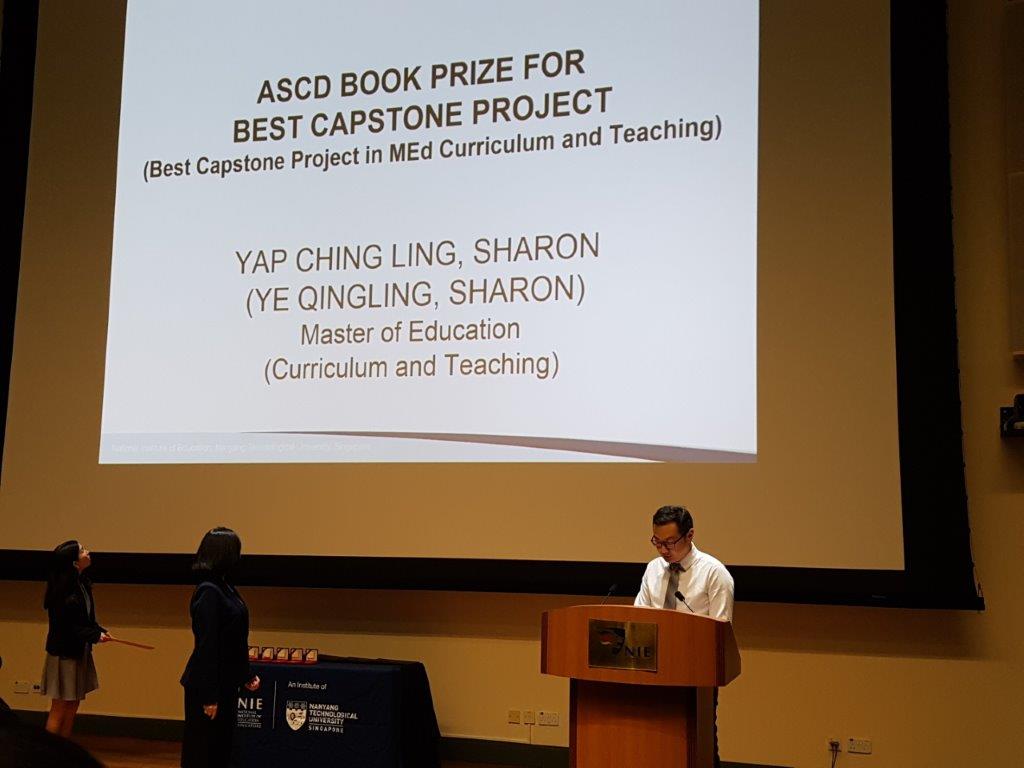
|
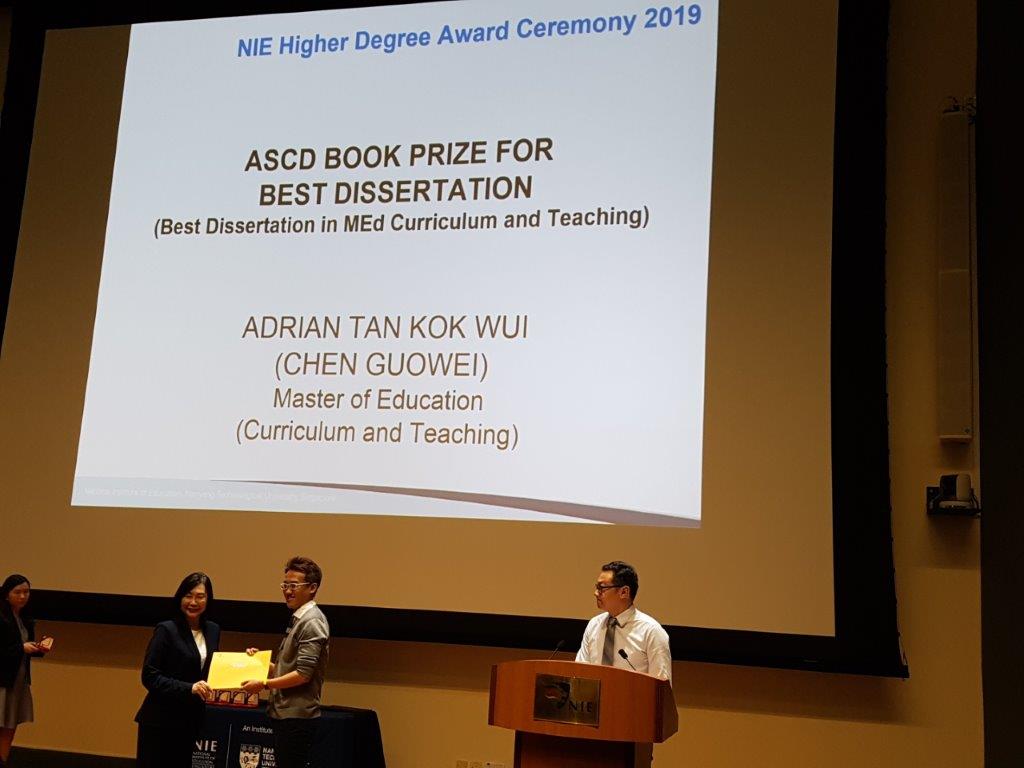
|
|---|---|
| Winner of ASCD Book Prize for Best Captstone Project Yap Ching Ling Sharon was not present to receive her award | Winner of ASCD Book Prize for Best Dissertation Adrian Tan Kok Wui, receiving his award |
Teachers' Conference
Aside from enhancing teacher development through workshops, ASCD
Singapore started to support the Teachers’ Conference, an initiative of
the Ministry of Education. With its beginnings in 2001, the Teachers’
Conference is a biennial event for teachers to deepen their pedagogical
skills and together, share teaching practices as a fraternity.
ASCD Singapore first sponsored a speaker for the Conference’s
keynote address in 2004 and has continued to contribute $10,000 to the
event. As it is able to access renowned overseas educators and trainers
due to its affiliation to ASCD International, ASCD Singapore also plays a
key role in helping to reach out to these experts, to share their
knowledge with Singapore teachers at the Conference.
Such speakers have covered wide-ranging topics: from the
critical role that the teacher plays in nurturing the spirit of
innovation and enterprise among students; to creativity; the
organisational implications of computer-supported activities; as well as
social-emotional and character development. Eminent speakers, to name a
few, have included Gary Marx, the President at the Centre for Public
Outreach, Vienna, Virginia; Frans Johansson, author of "The Medici
Effect"; researcher Dr John Seely Brown and Professor Maurice J. Elias
from the Psychology Department of Rutgers University.
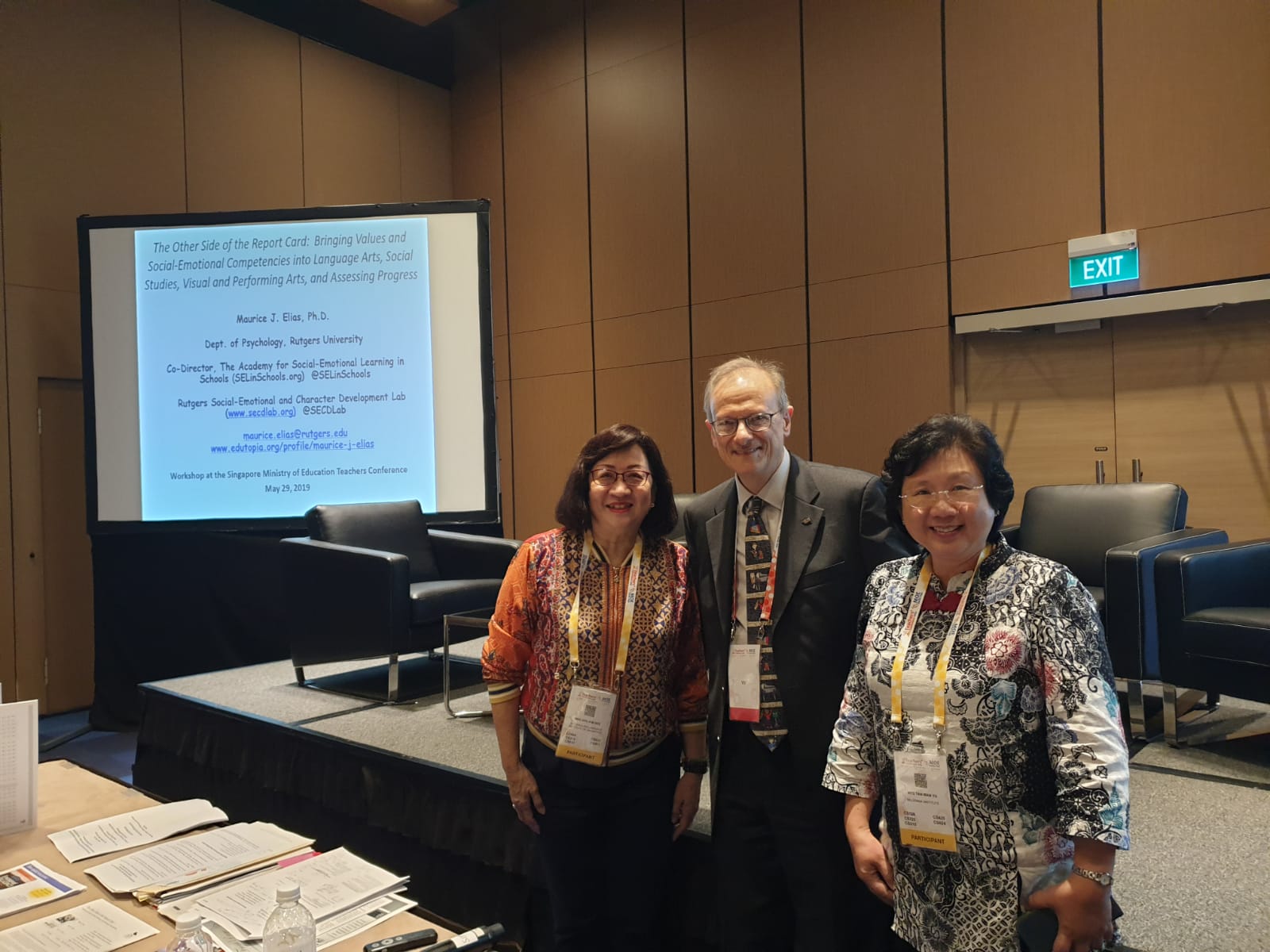
|
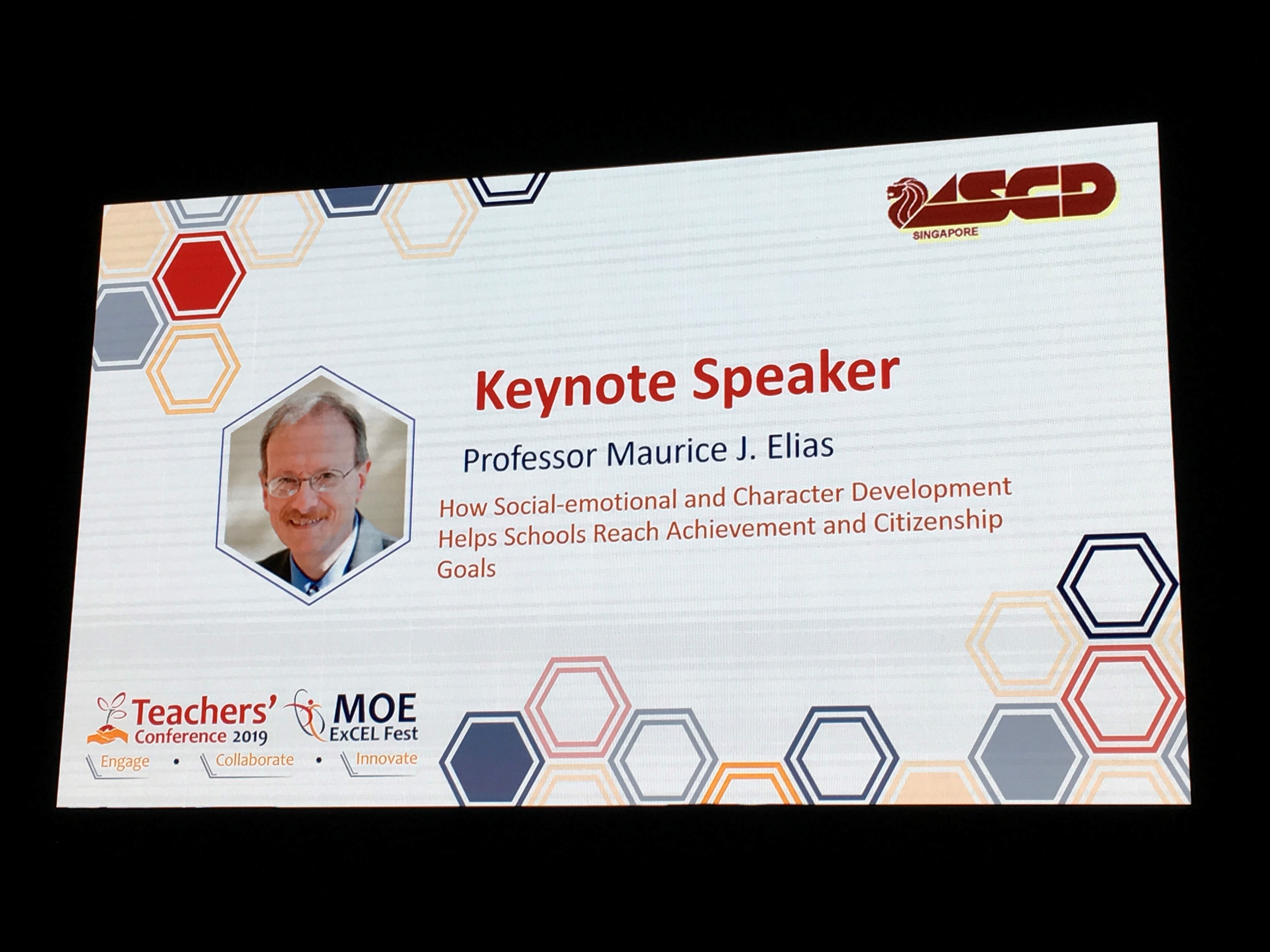
|
|---|---|
| Professor Maurice Elias (centre), with Soo Kim Bee and Tan Wan Yu |
Workshop: Questioning Strategies to Activate Student Thinking, by Ms Tang Swee Noi
When planned and executed in a strategic manner, classroom
questioning has high potential for engaging all learners in thinking and
speaking related to learning goals. This three-hour workshop seeks to
provide participants with tips and examples to help them develop
questioning practices that motivate students and activate their
thinking. Participants will become familiar with the ASCD Quick
Reference Guides (QRG) on Questioning Strategies to Activate Student
Thinking and have the opportunity to explore and apply questioning
strategies used in QRG in the Singapore context.
Only 30 seats are available, to be issued on a
first-come-first-served basis. Closing date is 1st April or when all
seats are taken. Free for Singapore ASCD members (who register by 20th
April) and S$50.00 for non-members.
Participants can choose to attend the workshop on either 12th
April (for secondary school teachers) or 26th April (for primary school
teachers).
30th Annual General Meeting and Buffet Hi-Tea
This year is the 30th anniversary of ASCD (Singapore), and all
members can look forward to a series of events and benefits. We kick
off with the
30th Annual General Meeting
on 29th March 2019, to be held at Orchard Rendezvous Hotel.
The Guest of Honour is Mr Edmund Wee, Founder of Epigram Books, who will
speak about "Everything you always wanted to know about publishing in
Singapore (but didn't know what to ask)".
Interested members can review the
AGM notice
and the
Singapore ASCD Constitution.
All members will receive a door gift. In addition, a lucky
draw will be held for members, with the prize being an air ticket plus
expenses (total S$3,500) to attend an ASCD International Conference of
the winner's choice during 2019/2020.
ASCD Empower19 Annual Conference
Our Immediate Past President Ms Yeo Hong Mui is attending the
ASCD Empower19 Annual Conference now, held in Chicago from 16-18 March.
Singapore ASCD is the only representative from Asia. Issues discussed at
the conference include membership and benefits, communication and
social media. All are facing the same challenges.
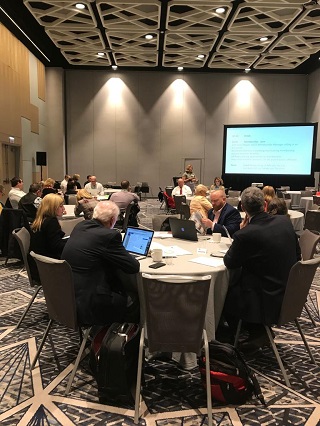
|
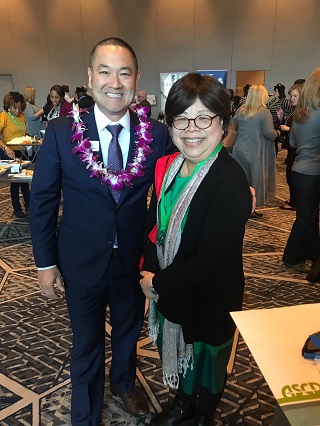
|
|---|---|
| About 30 delegates attended the ASCD Affiliates' meeting | Ms Yeo, with Mr Ronn Nozoe, ASCD Interim Executive Director |
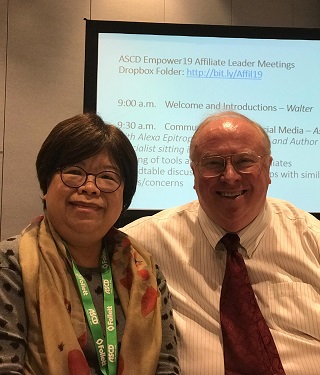
|
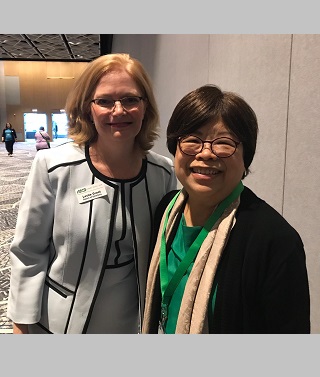
|
|---|---|
| Ms Yeo, with Mr Walter McKenzie, Senior Director for Constituent Services | Ms Yeo, with Ms Leslie Grant, ASCD President |


